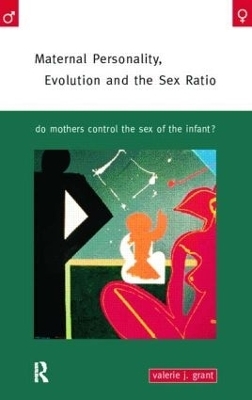
Maternal Personality, Evolution and the Sex Ratio
Do Mothers Control the Sex of the Infant?
Seiten
1998
Routledge (Verlag)
978-0-415-15880-0 (ISBN)
Routledge (Verlag)
978-0-415-15880-0 (ISBN)
Valerie Grant examines the hypothesis that it is a feature of the mother's personality - how dominant she is - that influences which sex she will conceive.
Women who are dominant are more likely to have sons. Demographic studies show that more male children are born after wars, yet most people believe that their baby's sex is a matter of chance - determined by the father's sperm. Valerie Grant presents evidence that the mother's personality - which is related to female testosterone levels - can actually influence which type of sperm fertilises the egg.
Using data from human and animal studies Valerie Grant discusses the implications for human evolution, developmental psychology and reproductive biology. Her claims are controversial and the implications of her findings far reaching. Whether mothers have sons or daughters may not be a matter of chance. It may depend on which sex infant the mother is more suited to raise.
Women who are dominant are more likely to have sons. Demographic studies show that more male children are born after wars, yet most people believe that their baby's sex is a matter of chance - determined by the father's sperm. Valerie Grant presents evidence that the mother's personality - which is related to female testosterone levels - can actually influence which type of sperm fertilises the egg.
Using data from human and animal studies Valerie Grant discusses the implications for human evolution, developmental psychology and reproductive biology. Her claims are controversial and the implications of her findings far reaching. Whether mothers have sons or daughters may not be a matter of chance. It may depend on which sex infant the mother is more suited to raise.
Valerie J. Grant is Lecturer in Behavioural Science at the School of Medicine, University of Auckland, New Zealand.
Chapter 1 Overview; Chapter 2 Defining and Measuring Dominance; Chapter 3 The Biological Basis of Dominance; Chapter 4 Evidence From Biostatistics; Chapter 5 The Physiology of Sex Determination; Chapter 6 Dominance in Animals; Chapter 7 Dominance and the Sex Ratio in Animals; Chapter 8 The Sex Ratio in Humans; Chapter 9 Early Experience and Evolutionary Advantage; Chapter 10 Sex P References and Sex Selection;
| Erscheint lt. Verlag | 15.1.1998 |
|---|---|
| Verlagsort | London |
| Sprache | englisch |
| Maße | 138 x 216 mm |
| Gewicht | 430 g |
| Themenwelt | Geisteswissenschaften ► Psychologie ► Psychoanalyse / Tiefenpsychologie |
| Sozialwissenschaften ► Soziologie ► Gender Studies | |
| Sozialwissenschaften ► Soziologie ► Mikrosoziologie | |
| ISBN-10 | 0-415-15880-X / 041515880X |
| ISBN-13 | 978-0-415-15880-0 / 9780415158800 |
| Zustand | Neuware |
| Haben Sie eine Frage zum Produkt? |
Mehr entdecken
aus dem Bereich
aus dem Bereich
vom Mythos zur Psychoanalyse des Selbst
Buch | Softcover (2023)
Kohlhammer (Verlag)
CHF 39,20
Grundlagen, Behandlungstechnik und Anwendung
Buch | Softcover (2022)
Kohlhammer (Verlag)
CHF 48,95
den Stand der Traumaverarbeitung erkennen und Behandlungsschritte …
Buch | Hardcover (2023)
Klett-Cotta (Verlag)
CHF 49,95


